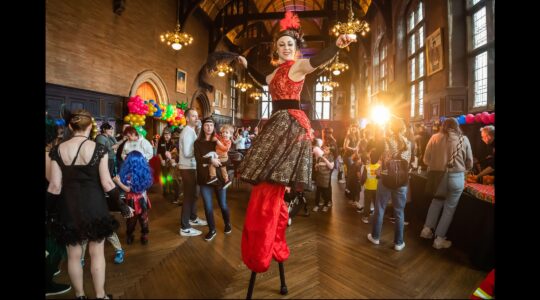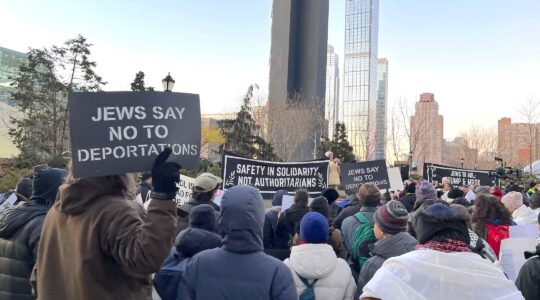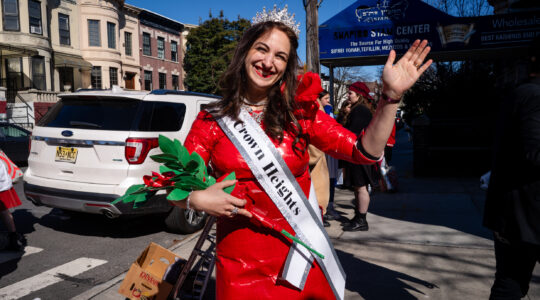Like biblical plagues raining down on them from an angry God, the white-bearded, black-hatted rabbi laid a string of curses upon the unsuspecting suburban partygoers.
Banging a siddur on a table and screaming “Shema Yisrael,” the rabbi, accompanied by a four-man entourage — all of whom had burst into a Great Neck home — lit into those gathered for an evening of celebration, mixed dancing and traditional Iranian fare in honor of a little girl’s first birthday.
After “shrieking Hebrew oaths,” the “uninvited” rabbi launched into a “lengthy diatribe” during which he told those who chose to remain at the party that they would be cursed with “illness, bankruptcy and tragedy for eternity,” according to a petition signed by some of those in attendance.
“They just came right in like a storm, inside the middle of the party,” said a woman who attended the December party but, like many others contacted by The Jewish Week, asked to remain anonymous because she fears for her safety. “They started to curse everybody, saying — ‘You’re going to have tragedies, everyone who stays here.’”
Guests and their children were allegedly so frightened by the rabbi’s intrusion that many left, while others stood shaking and crying, according to those in attendance.
After the rabbi left, rumors began circulating around the community about the presence of naked women at the party. Those in attendance suspect the rabbi and his men of spreading the reports.
The actions of Rabbi Mordechai Aderet — and the sheer incongruity of medieval-like curses being hurled at well-off Persian Jews in Great Neck, of all places — have sent shockwaves through the local Jewish community.
Other rabbis in the community seem stunned by Rabbi Aderet’s alleged behavior. Those at the party drafted an emotional memo to a Great Neck bet din detailing their “deep distress, sadness and anger” over the rabbi’s actions. It urged the rabbis making up the religious court to “use your influence to prevail upon your colleague to cease and desist from his unauthorized, illegal and unethical harassment of members of our community.”
And the bet din, run by Rabbi Eliyahu Ben-Haim, in turn circulated a letter among Great Neck rabbis that referenced the incident, but without mentioning Rabbi Aderet’s name, according to those who saw it. Only one rabbi is believed to have signed the letter.
“No one else wanted to even get near it,” said the one signatory, Rabbi Yamin Levy, who is vice president of yeshiva affairs at Yeshivat Chovevei Torah Rabbinical School and serves as a part-time rabbi at a Great Neck congregation, Beth Hadassah. “Rabbis don’t want to go on record as appearing like they’re against a colleague.”
Reached by phone, Rabbi Ben-Haim said he would not comment on Rabbi Aderet, then hung up. Rabbi Aderet refused to speak with The Jewish Week himself but asked that the paper call one of his main supporters who would speak on the rabbi’s behalf.
In an indication of how controversial Rabbi Aderet has become in Great Neck, the congregant tapped to speak for him would not agree to use his name, saying that his business might suffer from the association.
“They [the partygoers] exaggerated the event in order to take revenge against Rabbi Aderet and the Orthodox Jewish community because they don’t want Great Neck to become Orthodox,” Rabbi Aderet’s supporter said. “They don’t want another Five Towns.”
The supporter, who accompanied Rabbi Aderet to the party, claims he was invited, though he could not produce an invitation. Partygoers say Rabbi Aderet was not invited and that invitations were sent out to all of those on the guest list.
Rabbi Aderet’s supporter suggested The Jewish Week call Rabbi Avraham Cohen of Torah Va Danesh, an Orthodox synagogue in Great Neck, for comment. When reached, the rabbi said through a secretary that he “doesn’t want to get involved.”
he bizarre scene that played out in December didn’t come out of the blue, as it perhaps seems. Great Neck residents say it is part of a widening gulf in the community between a growing secularism on one hand, and a growing haredi element on the other.
Rabbi Aderet, a representative of the latter group, is a popular Ashkenazi kabbalist from upstate Monsey. Born in Israel, the rabbi, who is in his 60s, according to those close to him, came to the U.S. some 35 years ago. He arrived in Great Neck in the late 1990s, recently establishing a branch of his Monsey Beth Eliyahu shul in the North Shore town. While some in Great Neck say he has a sizeable following, the head of the New York Board of Rabbis knew nothing of him. Neither did a spokesman for Agudath Israel, a haredi umbrella group. The rabbi’s shul seems not to operate a Web site, but dozens of the rabbi’s lectures on the weekly Torah portion are available at TorahAnytime.com. He first attracted the attention of Great Neck’s Persian community in 1993, when he began delivering lectures near Persian offices in Manhattan’s Garment District, according to the rabbi’s main supporter.
For Rabbi Aderet, the path that brought him to barge into the Great Neck home began earlier that December day, according to sources. He apparently heard about the upcoming party that morning at a brit milah, through friends of those hosting the get-together. Allegedly, the rabbi objected to both the mixed dancing that might occur at the private party and the idea that people would be celebrating on the night before the Fast of Tevet, which marks the siege of Jerusalem. A second supporter said the rabbi gave the hosts ample warning that he’d be stopping by to see about the mixed dancing. The hosts deny the rabbi contacted them.
“What happened was not a pretty sight, and Rabbi Aderet just did some type of blessing in a loud voice — Shema Yisrael,” the rabbi’s main supporter said. “The next day was the day that Jerusalem was seized and it’s a fast [day]. Doing these kinds of things on the night before the siege is not a good thing.”
But since the fast did not begin until the following morning at sunrise, the party was in keeping with Jewish law, say those in attendance. They note that several similar celebrations — with rabbis in attendance — were taking place throughout the neighborhood. The host family had simply gathered to celebrate their daughter’s birthday with fellow Persian neighbors and relatives at a party that featured glatt kosher food, music and dancing, guests said.
Yet at approximately 10 p.m. that evening, Rabbi Aderet and his entourage parked two vehicles outside and entered the home uninvited; he unleashed his curse-filled tirade at the 60 or so guests present as well as their family members, according to the petition against the rabbi sent to the bet din. “The disruption he caused cannot be overstated,” it reads, stating that the events described are “undisputed, as witnessed by over 50 innocent by-standers.”
“Judaism has never and must never be used to bully and humiliate human beings in our own homes,” the petition continues. “Judaism has never and must never be used to turn Jews against one another.”
Said a guest who attended the party: “It was like bin Laden — all they needed were guns. My daughter was terrified after — she was screaming. She didn’t talk for three days after.”
Rabbi Aderet’s main supporter claims that on the day after the party, the host came to see the rabbi to clear the air and ask for the rabbi’s blessing. But according to guests, the hosts did not come seeking a blessing but rather demanded that the rabbi remove the curses from their home and write them an apology letter.
Rabbi Yosef Bitton of the Young Mashadi Jewish Center said he saw a draft of the letter distributed by the Great Neck bet din, but did not sign. He said he understood that Rabbi Ben-Haim felt that speaking directly with Rabbi Aderet was a more effective means of solving the problem.
“I think he preferred to talk to Rabbi Aderet and to use a different channel,” Rabbi Bitton said, stressing that Rabbi Aderet’s actions at the party are by no means representative of rabbinical practice in Great Neck. “It’s something that’s not in accordance with the spirit of unity, love of Torah that we all want to transmit to our communities.”
Other rabbis throughout Great Neck agreed, and some were still in shock that such an event could have even occurred in their backyard.
“Based on what I heard happened, I hope that people appreciate that the approach that most of the rabbis take with Orthodox, Conservative and Reform Judaism in Great Neck is quite different than what was described,” said Rabbi Howard Stecker of Temple Israel of Great Neck, a Conservative synagogue. “We try to bring people closer with an approach to Judaism that emphasizes growth that’s presented with love and respect.”
Beth Hadassah’s Rabbi Levy agreed. “Our style of presenting Judaism is different than his,” he said. “God doesn’t curse, people don’t curse. If that’s what he did, it’s not the kind of Judaism that I would espouse. But he does have a strong following.”
Last December, Rabbi Aderet received a special honor, the Kesser Torah Award, from the Mirrer Yeshiva Central Institute in Midwood, where one of his children studies. But school officials would say only, “They’re parents here and they’re a wonderful family.”
Though his congregants are predominantly Persian, the Ashkenazi rabbi manages to maintain a following of congregants, with 30 to 40 people showing up to a typical morning service, according to a party guest who has attended the rabbi’s services on occasion.
“His followers are really so dedicated to him so that they would do anything to protect him,” said the guest.
Another party guest called Rabbi Aderet’s followers “very fanatical and brainwashed” about the magnitude of the rabbi’s wisdom and said that his congregants seem to fear his alleged magical powers.
Yet some of Rabbi Aderet’s followers believe so much in his abilities that they call him a “messenger from God,” capable of saving them from both health and financial catastrophes.
“Rabbi Aderet has saved a lot of lives that were very close to being dead, and he has helped tremendous amounts of people when they have bankruptcies or any other financial differences in their life —and I’m one of them,” the main supporter said.
This congregant cites a 2007 incident in North Shore Long Island Jewish Hospital where his aunt had just suffered a stroke; doctors recommended against life support because the patient had no chance of recovery beyond a vegetable-like state. But when Rabbi Aderet arrived to perform Havdalah at her bedside, sprinkling wine on her forehead, the woman allegedly awoke and lived to see her son get married and two grandchildren grow, according to the congregant.
“I believe that Rabbi Aderet has a very big connection [to God] because I’ve seen it with my eyes,” the supporter said.
Rabbi Aderet’s presence in Great Neck is emblematic of changes taking place in the Persian community there, residents say.
“The community is moving in different directions in a way that didn’t happen when we were still living in Iran,” observed community member Ellie Cohanim, who did not attend the party. “There is a group that is becoming more secular, and there’s a group that’s taking on this very haredi brand of Judaism — and neither of those trends is normative to the Middle East. It’s not normative to how our parents and grandparents observed Judaism.”
According to Rabbi Levy, the trend toward kabbalistic Judaism and the charismatic, magical rabbi — “the Madonna syndrome” as he calls it — has spread far beyond Great Neck.
“There is this trend in Orthodoxy today where people are being drawn to the mystical rabbi, the rabbi that promises blessings and good fortune by virtue of association,” he said. “And that’s happening in Israel, throughout the U.S., throughout the world really. It’s not just in the chasidic movement. Now many rabbis present themselves that way. [Rabbi Aderet] has built a following like that that. … People just want to follow blindly. They just want a simple life, to turn over their thinking to a rabbi. I guess it works.”
As for those who attended the party — some say they are still traumatized more than two months after the incident — the ideal solution would be for Rabbi Aderet to simply pack up and leave their community.
“This is not Mea Shearim here,” said one party guest, referring to the iconic haredi neighborhood in Jerusalem. “This is Great Neck.”
| Signup for our weekly email newsletter here.
Check out the Jewish Week’s Facebook page and become a fan! And follow the Jewish Week on Twitter: start here. |
The New York Jewish Week brings you the stories behind the headlines, keeping you connected to Jewish life in New York. Help sustain the reporting you trust by donating today.





